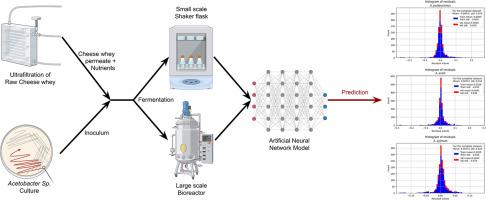Application of neural network in prediction of acetic acid yield by Acetobacters
Q1 Social Sciences
引用次数: 0
Abstract
In the present work, artificial neural network (ANN) is applied for the estimation of acetic acid yield for 3 different species of Acetobacters like, Acetobacter pasteurianus (NCIM 2104), Acetobacter aceti (NCIM 2116) and Acetobacter xylinum (NCIM 2526). Though there is open literature mentioning acetic acid and ANN can be found, they hardly describe the usage of ANN in prediction of fermentation based acetic acid production. Indeed, a deep dearth of existing literature is felt in this area to develop a robust ANN model to predict the yield of biologically obtained acetic acid and this work is a step towards bridging that research gap. The performance of the model has been estimated with R2 (0.992, 0.988 and 0.992, respectively for the mentioned microbial species) and RMSE (0.0287, 0.034 and 0.020, respectively for the same species). The most relevant operating parameters like, temperature, agitator speed, concentrations of supplemented yeast extract and tryptone, have been considered to carry out fermentation on cheese whey permeate containing fermentable lactose (48.5 g L-1) to transform into acetic acid. Outcome datasets obtained from rigorous experimental investigations performed on the direct fermentative production of acetic acid are trained in the ANN model to predict the product yield. Such machine-learning methodology encourages reasonably accurate prediction of product generation which is extremely tough to obtain through classical analytical processes.

神经网络在醋酸菌醋酸产量预测中的应用
在本研究中,人工神经网络(ANN)被用于估算 3 种不同的醋酸菌(如巴氏醋酸杆菌(NCIM 2104)、醋酸杆菌(NCIM 2116)和木质醋酸杆菌(NCIM 2526))的醋酸产量。虽然有公开文献提到了醋酸和 ANN,但几乎没有描述 ANN 在预测发酵法醋酸生产中的应用。事实上,在这一领域,现有文献对开发一个稳健的 ANN 模型来预测从生物中获得的醋酸产量的研究十分匮乏,而本研究正是朝着弥补这一研究空白迈出的一步。该模型的性能估计值为 R2(上述微生物物种分别为 0.992、0.988 和 0.992)和 RMSE(同一物种分别为 0.0287、0.034 和 0.020)。在对含有可发酵乳糖(48.5 g L-1)的奶酪乳清渗透液进行发酵以转化为醋酸的过程中,考虑了最相关的操作参数,如温度、搅拌器速度、补充酵母提取物和胰蛋白胨的浓度。从直接发酵生产醋酸的严格实验研究中获得的结果数据集,通过在 ANN 模型中进行训练来预测产品产量。这种机器学习方法有助于合理准确地预测产品生成量,而通过传统分析过程很难获得这种预测结果。
本文章由计算机程序翻译,如有差异,请以英文原文为准。
求助全文
约1分钟内获得全文
求助全文
来源期刊

South African Journal of Chemical Engineering
Social Sciences-Education
CiteScore
8.40
自引率
0.00%
发文量
100
审稿时长
33 weeks
期刊介绍:
The journal has a particular interest in publishing papers on the unique issues facing chemical engineering taking place in countries that are rich in resources but face specific technical and societal challenges, which require detailed knowledge of local conditions to address. Core topic areas are: Environmental process engineering • treatment and handling of waste and pollutants • the abatement of pollution, environmental process control • cleaner technologies • waste minimization • environmental chemical engineering • water treatment Reaction Engineering • modelling and simulation of reactors • transport phenomena within reacting systems • fluidization technology • reactor design Separation technologies • classic separations • novel separations Process and materials synthesis • novel synthesis of materials or processes, including but not limited to nanotechnology, ceramics, etc. Metallurgical process engineering and coal technology • novel developments related to the minerals beneficiation industry • coal technology Chemical engineering education • guides to good practice • novel approaches to learning • education beyond university.
 求助内容:
求助内容: 应助结果提醒方式:
应助结果提醒方式:


